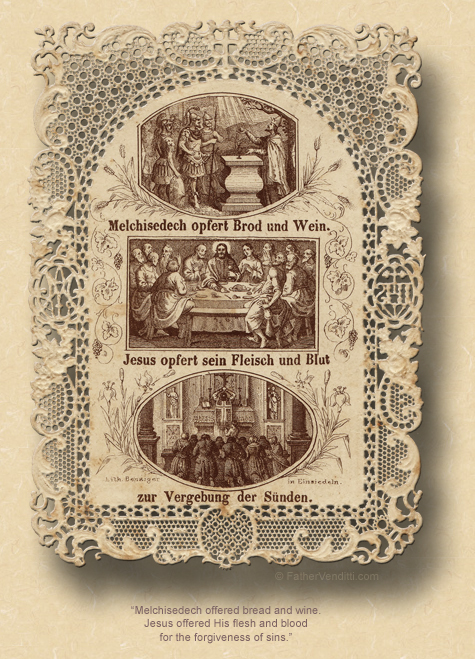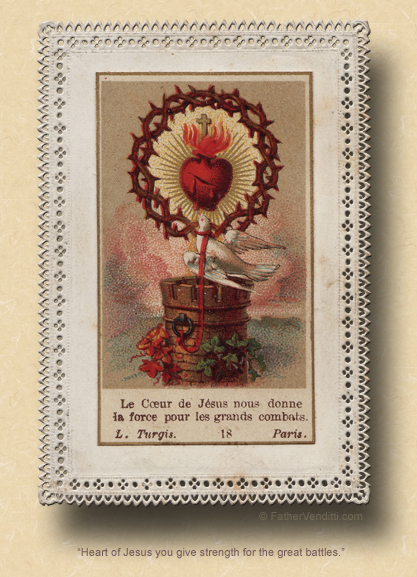When Everyone Behind You is Shouting at You to Keep Moving, and You Alone Can See You're on the Edge of a Cliff.
The Fifth Sunday of Easter.
Lessons from the primary dominica, according to the ordinary form of the Roman Rite:
• Acts 6: 1-7.
• Psalm 33: 1-2, 4-5, 18-19.
• I Peter 2: 4-9.
• John 14: 1-12.
The Fourth Sunday after Easter.
Lessons from the dominica, according to the extraordinary form of the Roman Rite:
• James 1: 17-21.
• [The Gradual is omitted.]
• John 16: 5-14.
The Sunday of the Samaritan Woman.
Lessons from the pentecostarion, according to the Ruthenian recension of the Byzantine Rite:
• Acts 11: 19-26, 29-30.
• John 4: 5-42.
FatherVenditti.com
|
 10:42 AM 5/14/2017 — The younger among us will probably not be able to relate to this, but many of you can, I’m sure. I’m at that unfortunate age where my mental acuity is beginning to deteriorate, but yet still alert enough to be able to recognize that fact. Every time I stand at this pulpit and preach to you, that represents anywhere between two and four hours sitting in front of my computer trying to figure out what to say, and then I have to read it off of a piece of paper because I can’t keep it in my head anymore. 10:42 AM 5/14/2017 — The younger among us will probably not be able to relate to this, but many of you can, I’m sure. I’m at that unfortunate age where my mental acuity is beginning to deteriorate, but yet still alert enough to be able to recognize that fact. Every time I stand at this pulpit and preach to you, that represents anywhere between two and four hours sitting in front of my computer trying to figure out what to say, and then I have to read it off of a piece of paper because I can’t keep it in my head anymore.
Those of you who are with us here every day at the Shrine have certainly noticed that I don’t preach at weekday Mass nearly as much as I used to, and when I do I often repeat things I’ve said before. Part of it is my mental slowness, and part of it is the fact that the Lectionary of the Roman Missal has been developed on the presumption that there is a homily only on Sundays and Feast days, because many of the lessons presented on Sunday are being repeated during the week on other days. Today’s Mass is a case in point, as both our first lesson from Acts and our Gospel lesson from John were both heard not too long ago on different days, and all I can offer you is what I’ve said about them before.
The Apostolic lesson of today's Mass is the ordination of the first deacons; but, when you look at the reading from Acts carefully, you realize that it's much more about priests than about deacons.
What is the reason the Twelve give for the ordination of the Church's first seven deacons? They say, “It is not right for us to neglect the word of God to serve at table” (Acts 6: 2 NABRE). They were not running a restaurant. The Church, as it does to this day, cared for the poor; at Holy Mass, collections were taken up, just as they are today, and much of what was collected went to those in need, and this required a lot of footwork. The Apostles had been doing it all themselves, but it soon became clear that they couldn't give enough attention to preparing for and celebrating the sacred mysteries if they also had to be involved in all these charitable activities; so, the deacons were ordained to do this sort of work for them.
And what's important for us to notice is that, even in the time of the Apostles, there is already a well-defined division of labor in the Church: the job of the priest is to offer sacrifice and preach the Word of God; the more pragmatic duties of the Church are given to others, and specifically for the reason of leaving the priests free to perform their sacred functions.
I was a pastor for many years, and one of the most frustrating things about being a pastor is that most of what you do has nothing to do with being a priest: you are a maintenance man, you are an accountant, you are social worker, you are a marriage counselor, you are a fund raiser, you are everything except what you were ordained to be, which is a preacher of the Word and an offer-er of sacrifice.  When Pope Blessed Paul VI reinstated the diaconate as a permanent ministry in the Church, no longer restricting it to those in preparation for the priesthood, his idea was to correct this problem; but, it didn't turn out that way, as most of the deacons ordained since then are all married men with jobs and lives of their own, and whose diaconate is more or less restricted to helping out at Holy Mass on Sundays, which, as you can see from today's first lesson, has nothing to do with what they were originally ordained to do. When Pope Blessed Paul VI reinstated the diaconate as a permanent ministry in the Church, no longer restricting it to those in preparation for the priesthood, his idea was to correct this problem; but, it didn't turn out that way, as most of the deacons ordained since then are all married men with jobs and lives of their own, and whose diaconate is more or less restricted to helping out at Holy Mass on Sundays, which, as you can see from today's first lesson, has nothing to do with what they were originally ordained to do.
What I want to offer for your reflection—as far as this first lesson is concerned—is a simple and brief appeal to not only pray for priests every day, which I'm sure you do, but also encourage you to make a resolution to let your priests be priests. The Holy Priesthood is not an office of authority, but an office of service; he stands in the place of Christ as a victim for sin, one who leads us in prayer and presents to Almighty God the offering of sacrifice for the remission of sin on behalf of the souls entrusted to his care; and we should not attempt to draw him out of the role.
Take confession, for example. So many times we go into the confessional and start telling the priest about our problems, but that's not what he's there for; he's there to hear us accuse ourselves of our sins on behalf of Christ, impose whatever penance is appropriate, and impart to us our Lord's absolution. Why we sinned, what led us to sin, what we're feeling about our sins is not relevant. “Father, my daughter-in-law makes me so mad….” Except you're not there to confess your daughter-in-law's sins; you're there to confess your sins. Why you said something uncharitable to your daughter-in-law doesn't matter, and the priest has no need to know that; all he needs to know to absolve you is that you said it and that you're sorry.
I think it's important to meditate frequently on the last line of today's first lesson; for, what was the result of the ordination of the deacons? What did the commission to these seven men to assume the more mundane tasks of the Church do? “The word of God continued to spread, and the number of disciples in Jerusalem increased greatly; even a large number of priests were becoming obedient to the faith” (6: 7 NABRE). Saint Luke is, of course, speaking of Jewish priests in that last sentence, but the irony of his choice of words should not be lost on us. If we have ever been concerned about the holiness of our priests, if we have ever wondered why this priest or that whom we may know is not what we think he should be as a priest of Jesus Christ, one of the reasons may be that we keep expecting him to be what he is not. After the example of our Lord, the priest is ordained to guide, to teach, and to sanctify. Everything else is—or at least should be—irrelevant for him. So, let us pray for our priests, but—even more importantly—let us also resolve to let our priests be priests.
The model for the priest is, of course, our Blessed Lord, who shows us His priestly heart in a very beautiful way in today’s Gospel lesson. Here he exemplifies what the true priest is meant to do: lead souls to God. Jesus Christ is “the way, the truth and the life,” or so the Holy Gospel tells us. In knowing Him we know the purpose of life.  Our life is an ongoing journey toward Him, and it’s in the Holy Gospel that we learn the characteristics of His life, how to imitate Him, how to follow in His footsteps, not so much in the sense that one man will attempt to follow in the footsteps of another simply because he is admired, but because we know that Jesus is God Who has become a Man, so in following Him we follow God to Himself. Our life is an ongoing journey toward Him, and it’s in the Holy Gospel that we learn the characteristics of His life, how to imitate Him, how to follow in His footsteps, not so much in the sense that one man will attempt to follow in the footsteps of another simply because he is admired, but because we know that Jesus is God Who has become a Man, so in following Him we follow God to Himself.
So as Christian souls we want to identify with our Lord, want our daily lives to be a reflection of His. In this way, we strive, in a good way, to become Christ; but, to become Christ we must see ourselves in Christ. It isn’t enough to have a general idea of the spirit of the message of Jesus. We have to learn how to observe the details of His life, His attitudes, His priorities, the kind of people with which He surrounded Himself, and what He tasked them to do. Saint Josemaría Excrivá once said, “When you love someone, you want to know all about him, his life and his personality, so as to become like him. That is why we have to meditate on the life of Jesus, from his birth in a stable right through to his death and resurrection” (Christ is Passing By, 14).
Of course, in doing this, we recognize that we are studying our Lord’s humanity. Not to say that His divinity doesn’t shine through at all times, because it does. Everything He does as a Man He does as God, and because He is God. All the more reason for us to mark well His human reactions and attitudes: when we see His compassion when He meets people in need, when we see Him tired after a long day’s journey, when we see Him impressed by the faith of a mother or of a centurion, when we see Him patient with the defects of His most faithful followers.
And the first—and perhaps most important—lesson this exercise teaches us is stated outright by our Lord Himself at the very beginning of today’s lesson: “In my Father’s house there are many dwelling places” (John 14: 2 RM3). It doesn’t simply teach us how we must be concerned with all sorts of people, but most importantly it teaches us we don’t have to fit the cookie-cutter to be worthy of our Lord’s love. No matter who we are, no matter what we’ve done, no matter what struggles beset us, we will always have a place in the Heart of Jesus.

|

